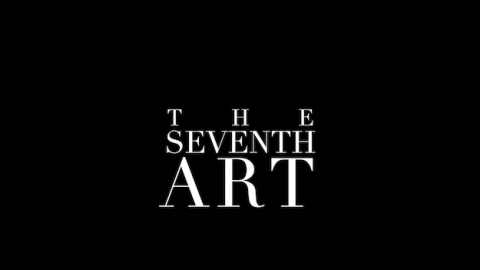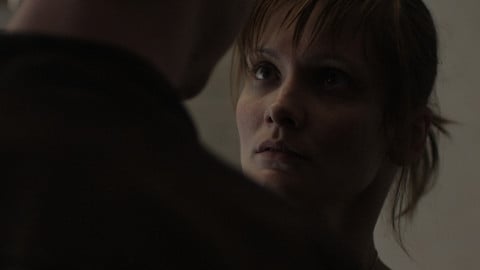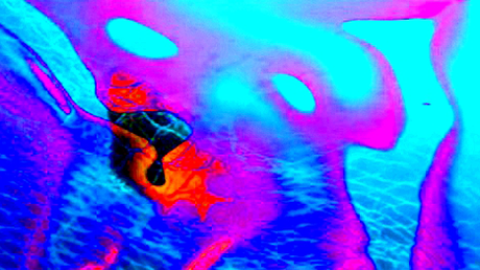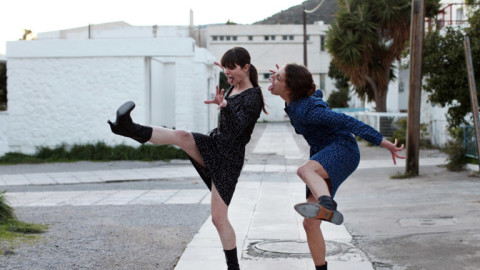NYFF Interview: Athina Rachel Tsangari
For Athina Rachel Tsangari, making movies is mostly a matter of camaraderie. She simply, “found herself making movies” out of a sense of necessity and pleasure—what she calls a love affair between work and life. Tsangari’s talents span theater design (projecting images), as well as directing, writing, and producing films. Her versatile body of work has occasionally linked her with friends like Yorgos Lanthimos with whom she produced films like Kinetta (05), Dogtooth (09), and Alps (11), and Richard Linklater in Before Midnight (14) in which she made some memorable pronouncements in the dinner-table battle of the sexes.
The last feature Tsangari directed, Attenberg (10), looked at a wonderfully genuine 23-year old coping with her father’s terminal illness, all set against the bleak background of a desolate, industrial town in Greece. The woman’s fascination with David Attenborough’s wildlife documentaries feeds her resistance toward the human species, where sex, death, and social structures are merely parts of the eccentricities of human nature. This irrationality is further explored in Tsangari’s latest feature Chevalier, a skewed comedy that observes male group psychology. Aboard a luxurious yacht, six heterosexual male friends and acquaintances compete to be “the best in general.” They comprehensively evaluate and rank one another in a testosterone-laden game that involves ranking sleeping postures, diet habits, and of course, erection lengths. Tsangari frames this world of men, their idiosyncrasies and affects, and shoots her subjects with an eye that’s equally affectionate, satirical, and distanced.
The Film Society of Lincoln Center has invited Tsangari to be this year’s Filmmaker in Residence. The program first welcomed British filmmaker Andrea Arnold (Fish Tank) and last year, Argentina’s Lisandro Alonso (Jauja). FILM COMMENT spoke to Tsangari a week before the U.S. premiere of Chevalier on October 7 in the New York Film Festival. 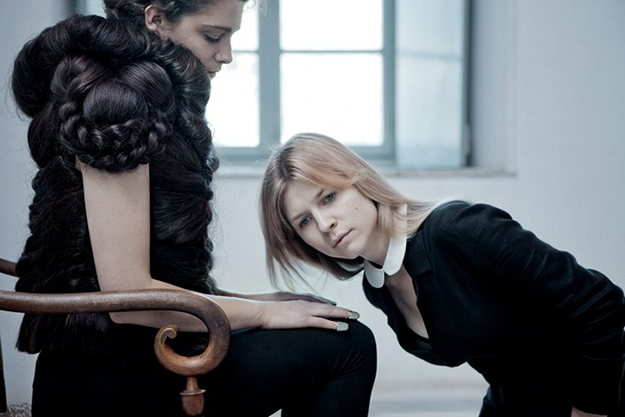
The Capsule
Chevalier has such a strong premise. The film surrounds this central idea of six men and a crew on a yacht, and you keep things within that space. Could you take me through the process of getting to that point?
It’s always the most difficult thing for me to describe how a film originates. Because I don’t prepare films this way, it’s not like, “OK, I’m going to do a film about masculinity or about six men on a boat.” I never start with a story—I usually start with a few images and a kind of sense that I have about the situation.
I made a medium-length film after Attenberg called The Capsule (12). It’s the companion film to Chevalier. It had an all-female cast and was again a film about power and control within a group of the same sex. I was fascinated by how power and desire develops if you remove the typical sexual dynamics within heterosexual groups. I collaborated on the script with a Polish painter I admire and whose imagery inspired the film, Aleksandra Waliszewska. It was a fantasy film in a kind of “boarding school.” The girls are born having a very limited life cycle, four days. In these four days they go through the entire process of becoming humans, women and social beings. They are taught by the institute’ s headmistress who is trying to determine who is the strongest among them who can take her place so she can finally retire and die. Their education is a game of power and supremacy.
I thought it would be interesting to do the same with a group of men in another inescapable enclosed space. Attenberg was set in an inescapable ghost-company town. My first feature, The Slow Business of Going (00), was set in hotel rooms in the near future. I’m interested in setting up the relationships in controlled spaces, three steps away from realism. I haven’t yet done the full leap to naturalism. I guess I’ve been testing what I call screwball tragedy, part screwball, part Greek tragedy. In ancient Greek tragedies the cadence of speech is something extremely important, it’s as important as the content of the language.
One of the things that fascinates me is the anthropological quality of your films. We are observing human behavior in a detached way, as if we are watching animals interact.
Yeah, taking a step back is something that I’ve done in my films. I withhold full-on immersion and in the end there’s not really a release nor redemption so it’s… you’re finding me right now as I’m working on new scripts at the point where I’m getting ready, for the first time, to introduce in my films the so-called third act, the act of redemption. It feels almost like a big and terrifying moment. Like I really have to understand or accept redemption for my characters because I guess it’s something that I haven’t understood or accepted for myself.
There’s lots of agony built in that process and that’s why it’s difficult for me to talk about it. It’s something that’s so internalized as a process. For example, in a very roundabout way, retracing Chevalier, I had two persistent images in my head. When I’m excited by images that are mysterious enough that I don’t know why I thought of them, then the process of trying to find out their origins or continuation into something else is what really excites me to sit down and write. One of them was the opening image in Chevalier, these little bobbing things coming out against a huge rock and I didn’t know what are these bobbing things and I didn’t know why there was this huge rock that was blocking the frame and then I started asking: what can they be? Where do they come from? So in a way, it’s almost like thoughts and life emerging from this primordial blob which is our brain and the sea and nature and space.
The other image was men peeling each other’s skin. Because I couldn’t do that literally, I said: “OK, how else can they peel each other’s skin?” This sort of visceral thing which becomes literal because in the end they are divers and they help each other taking off their suits, it is something they do because it’s impossible to take your rubber suit off by yourself, so there is suddenly this sense of camaraderie there, and community and union. It becomes something very visceral and very abstract at the same time.
Once you have those two images, what happens next?
I went to Efthymis Filippou, whom I’ve never worked with, but I’ve known for years because he’s been working with Yorgos [Lanthimos]. I went to him with the idea that these men convene in a house or somewhere, playing some kind of game or having some kind of secret society. Then it’s just a matter of talking and slowly figuring out: “OK, maybe they’re not a secret society.” We were figuring out what they’re not and just by that method of subtracting what they’re not, we decided what they are, and then we just went along with it, which was a fun process especially when we figured out the game of who was the “best in general.” Because then the possibilities are endless. It’s a gigantic thing that could end in so many ways.
I think one of the criticisms of the film is that it doesn’t explode, it doesn’t reach a point where you actually root for one of them, someone dies, there is big climax, or a big brawl between all of them. But I think we both felt that in a way, it’s much more bitter this way. No one is really a winner, there’s never a clear victory. There’s just the game that keeps perpetuating itself.
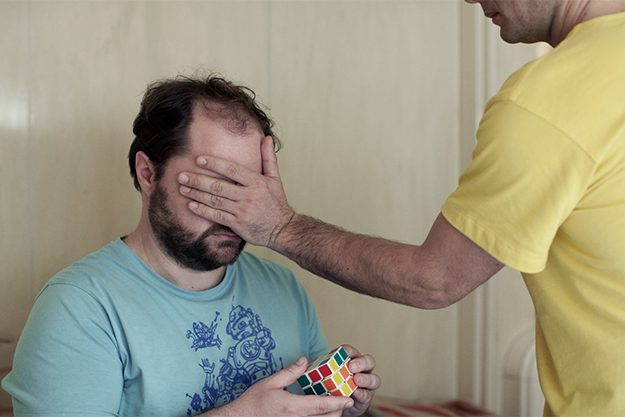
Chevalier
What was casting these men like?
It took me a long time to cast. It’s quite difficult to find actors in Greece who are not overly “actorly” and projecting, because most of actors are in theater and television. We don’t have such a big film industry so there’s a different kind of acting for the screen. It was actually a long casting process, we looked at a lot of actors and non-actors. We didn’t read lines, we just had conversations to see if I could work with someone’s personality, if I could live with them for two months, if they could excite me, if I could excite them back. You have to be turned on when you make a film, otherwise it becomes dreadful. You’re creating a fantasy world that’s run like a war expedition and it needs to be absolutely precise and organized. If at any moment you just look around and feel like it doesn’t make any sense and there’s no reason for it to exist, it collapses. So it’s very important to work with people who reassure you through shared energy and talent every time you have second thoughts.
What were the dynamics like on set?
They had very different personalities. I knew that would work well between them and they would react very well. When I say very well I mean, not that they would get along, but that one would be a catalyst for the other. A lot of the relationships were solidified and became more precise when we started rehearsing, like the actors that I casted as brothers became brothers quite quickly and still are today. When we rehearsed, we threw out a lot of the scenes that didn’t work and new scenes were introduced that they suggested. We were very lucky because we had the boat available to us for a month before we started shooting so we actually rehearsed in there every day and the dynamics were created there. It was like conducting a symphony of voices and bodies. It’s a very strenuous process also because the kind of tone I was going for, could easily become a sort of comedic self-congratulatory tone like, “Haha, aren’t we funny?” or really morose or too dark. I always feel very tender towards my characters. Curiosity and love propel me to do that and I think keeping a bit of a distance makes it sharper.
Was there competition among the actors?
Of course, but in a very creative and productive way. The most important thing for me was to keep the game going and to keep the actual process of the shoot going without it becoming nasty. Of course, they were very competitive with each other. They also came from completely different kinds of acting. Not all of them were actors—one of them is Greece’s biggest pop star, the guy who plays Christos, Sakis Rouvas, is the most popular man in Greece in the last 20 years. So you have him, and then you have Yiorgos Kendros who plays the doctor. He is exclusively a theater actor who does Chekhov and very classical theater. He has never made a film in his life. Then there’s Vangelis Mourikis, who is a very seasoned cinema actor who I had worked with in Attenberg. Then Yorgos who is played by Panos Koronis, he is a film director who had some theater acting experience from French theater in Los Angeles a long time ago— he actually played my husband in Before Midnight [laughs].
When I went to the first rehearsal with my assistant director Anna Nikolaou I was extremely terrified. I remember driving to the boat and just shaking and saying: “What have I gotten myself into?” I don’t think it would be different if I were a male director, it’s just walking into a set where you have all these men, all these very established actors, big personalities, on a boat but without having the sort of experience of a movie set. It felt almost like the sight of an experiment that could go wrong and at any point the movie could implode and I could be slaughtered. I don’t know how we did it. I think it was a well-balanced selection of crew as well as actors. I had a great crew that I usually work with and I think everyone realized the difficulty of the situation. It felt like a church, Everyone was quiet looking at the sea.
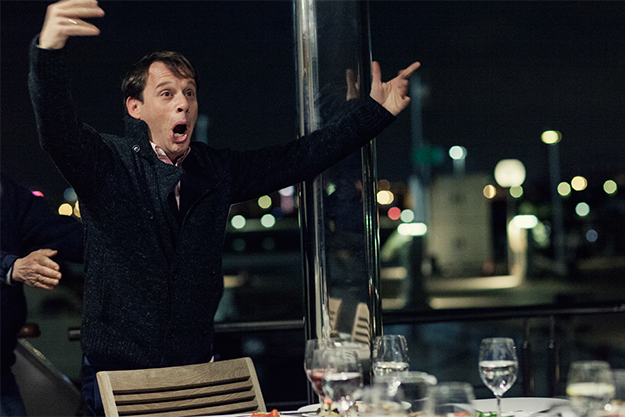
Chevalier
And you were the high priestess…
[Laughs] I don’t know what I was, a kind of a traffic controller: red light, green light, go, stop, pause, faster, slower… Basically that’s what it is. I never really gave them any directions in terms of their characters’ background, we never discussed these things. It was all about the rhythm, the cadence, and the precision of the movements. We repeated the same stuff over and over again in rehearsals to the point where they’d get really exhausted or really irritated. That’s when they wanted to kill me, but at that point I didn’t stop, I just said: “Do it until each one of you is a single instrument. It needs to sound just right in terms of this symphony we’re building.” For example, we shot that that big dinner scene, when they decided the game, for a couple of days. We rehearsed a lot because it was a scene where each character was emerging and the game was being set up. It was extremely important how it was going to be played out and how it was going to be choreographed with the camera, so it was not just shot / reverse shot. In each film I choose a challenge and the challenge for Chevalier was how to shoot talking faces.
You mean challenge in terms of cinematography?
The mise en scène. In Attenberg it was all about these very carefully composed and lit shots. It was about loving the space, and the bodies within the space. Chevalier was not about beauty, it was really about understanding the face and the voice, for me, and how to do it in an enclosed space without being stilted. We were moving on sliders all around the action because I didn’t want to keep setting cameras and interrupting the flow of the performances. DP Christos Karamanis and I worked on the basic visual syntax during rehearsal, it was the first time we worked together. On set he was like a cat. He worked around the men discreetly without interrupting, without his energy rubbing off in a wrong way. It was difficult what they had to do. They had to talk a mile a minute and maintain this tonality between deadpan humor and drama and negotiating egos under the table, so we had those sliders and we were constantly sliding back and forth and around them, quietly.
I thought it was beautifully shot: the camera takes a step back and lets things happen naturally on screen. I’m a big fan of that relationship between the camera and space. It’s something you do very well and it’s something that I like about your movies. When Yorgos is doing push-ups in his cabin, the frame is set up a bit distanced so he appears and leaves the frame every time he does a push-up.
That was something that we did a lot in the cabins “zone.” Their cabins were covered in a different way than upstairs where the common room was. When they are in the cabins, there’s always a fragmented space where basically you don’t know what’s real and what’s a reflection. We added mirrors on top of existing mirrors and we shot on cinemascope so it was interesting to frame in thirds or fourths. Also, I chose this boat because of its spaceship-like white lacquered glossy walls, so that meant that every single reflection, every single movement from the crew was there in the shot. So you can imagine, we were not even breathing. It doesn’t seem like it, but the boat was actually much smaller than it looked.
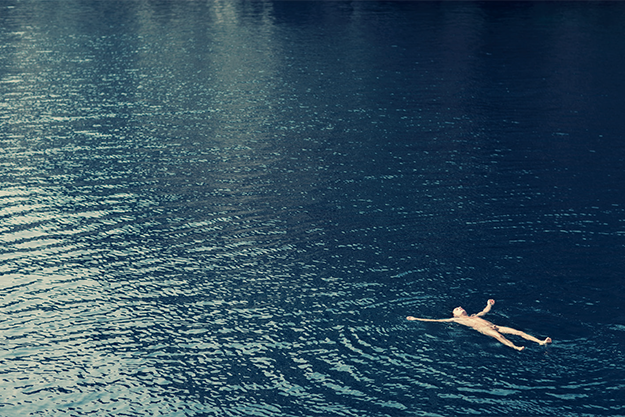
Chevalier
Your work has a variety of credits, from art direction to directing, producing and even acting (in Linklater’s Slacker and Before Midnight). Do you put any of them before the other?
I’m definitely not an actress. For a while, after The Slow Business of Going, I thought I was never going to direct again. I was a projection designer and was really happy working with projected images and buildings. Anything that had to do with that turned me on. It’s all about being turned on and being happy, getting yourself out of bed every morning and feeling like it is part of your life. That life and work inseparable lovers. I’m extremely happy when I produce and I consider this… I think the French term cinéaste is much more precise than “film director” or “film producer.” It’s been amazing working with Yorgos and producing together out films in Greece. I learned tons from him, as I did with Rick [Linklater] who first turned me on to this crazy racket. And in the end it’s not about filling out specific roles, but the gift of working in collaboration with someone who inspires you… Right now, it seems like I have a couple of stories in me, so I’ll keep writing
Can you talk about the scripts that you’re developing right now?
I’m quite superstitious and I can see how any project can fall apart at any moment, but I guess it’s the first time when I felt like I had a better ground to stand on, to develop and maybe realize eventually these films. One is an action neo-noir screwball tragedy and the other is a science-fiction screwball tragedy. One is The Capsule as a feature, which I’m very excited about. I feel like there was a lot of potential in that story. The other one is a science-fiction film that I’ve been writing. It’s called White Knuckles. I’m working on that right now, and it’s the neo-noir action, the one that hopefully I’m going to do next starring and working again with Ariane Labed, as the main criminal.
Have you gotten a chance to see any of the films at the New York Film Festival?
I’ve set up camp here. It’s part of my residence to have the guilt-free chance to pause everything for 10 days and see all these very different films, the one after the other, across the street from one another, in neighboring screens, all day, every day. It’s bliss and purgatory at once, melting in this synesthesia that’s cinema and losing myself and feeling completely immaterial, insufficient, and discombobulated. Lost into this world that someone else created for you… thank God.



